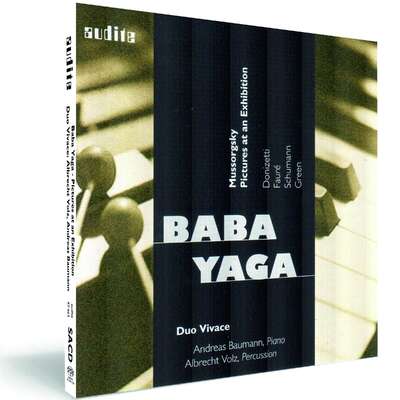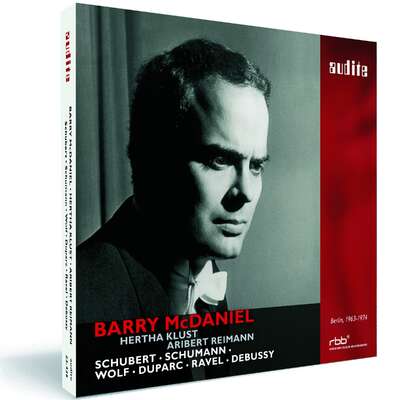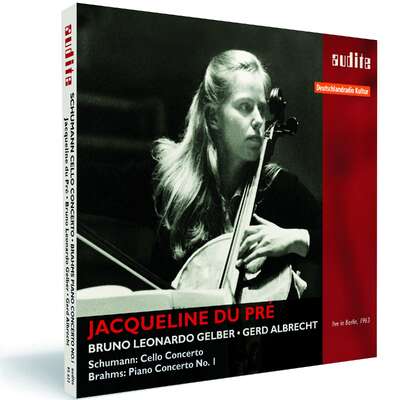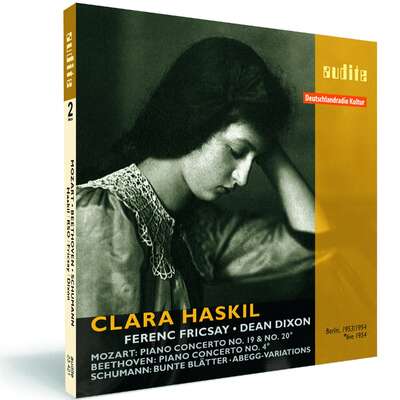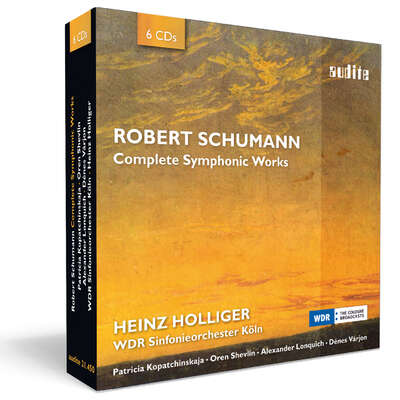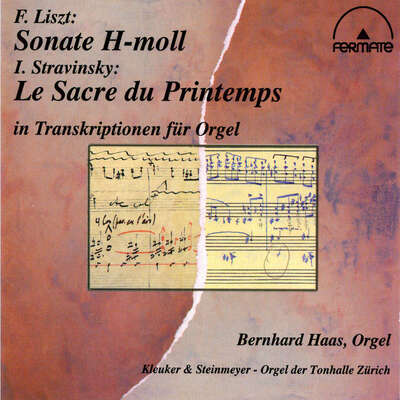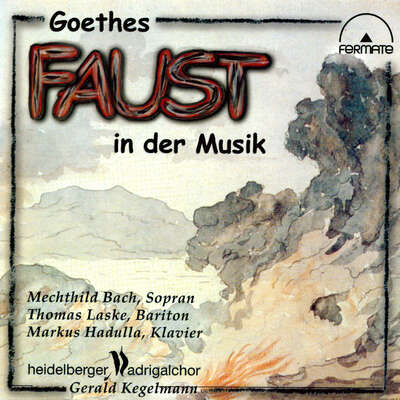
Auto-Rip
Jimin Oh-Havenith’s powerful and nuanced playing beautifully realises the unique richness of Schumann’s Sonata Op. 11 and Fantasie Op. 17. more
"[...] imaginative, pure, fresh, and with immense clarity of performance. [...] a promising start to this new Schumann series." (Pizzicato)
Track List
This bonus track is only available as a download!
Details
| For Clara | |
| article number: | 20.050 |
|---|---|
| EAN barcode: | 4022143200501 |
| price group: | BCA |
| release date: | 3. March 2023 |
| total time: | 78 min. |
Bonus Material
Informationen
This new audite release marks the beginning of a planned three-disc series with Jimin Oh-Havenith. Here, the pianist will present her personal perspective on Robert Schumann, whose contribution to romantic piano music is unparalleled, particularly so his series of masterpieces composed between 1830 and 1839. The first Sonata in F sharp minor, Op. 11, and the Fantasie Op. 17 form part of Schumann's exploration of the classical sonata form, especially that of Beethoven and Schubert. Due to their poetic and autobiographical-programmatic charge in combination with a novel, decidedly contrapuntal pianistic virtuosity, they remain among the most demanding piano works of the romantic period, and are also unreservedly loved by performers and listeners. Jimin Oh-Havenith's playing, both powerful and nuanced, beautifully realises the unique richness of this music.
Reviews
Schumann-Journal | 11/2023 | Jan Ritterstaedt | March 1, 2024
Die Interpretin schaut tief hinein in diese Musik. Mit Oberflächlichem gibt sie sich nicht zufrieden. [...] Dazu kommt die große technische Souveränität der Pianistin: bis in die letzten Winkel hat sie Schumanns komplexen Klaviersatz durchleuchtet und für sich erschlossen.Mehr lesen
Fanfare | 47:1 (Sept/Oct 2023) | Scott Noriega | September 1, 2023 | source: https://www.pres...
The current recital of piano works by Robert Schumann is titled For Clara and includes two of the composer’s largest works for solo piano dedicatedMehr lesen
Both works are among the very greatest Schumann wrote in the solo-piano medium, and both have been well recorded in the last century. That does not mean that there is nothing new to say with this music. But for me, if one is going to choose to tackle these oft-played pieces, then one needs to have something unique to bring to them. There are also some essential qualities that a good Schumann player should have in my book: a lyrical sense, one that allows not just beautiful melodic playing, but also beautiful figurative-melodic shaping; a good rhythmic sense, one that allows the pianist to juxtapose the incredibly dense contrapuntal lines that appear throughout his music, along with Schumann’s incredibly difficult rhythmic quirks; and, importantly, a wild side—a Florestan to the calmer Eusebius, allowing one to let go, while still maintaining a sense of the whole. Oh-Havenith certainly has some of these qualities: a lovely warm sound perfect for the numerous moments of quiet reflection in this music—the enchanting opening melody in the second movement’s Aria in the Sonata or the lovely figurative broken-chord progression in the Fantasie’s Langsam getragen. Check on the first quality. She is equally adept at bringing out the numerous metrical shifts in the music. A beautiful example comes in her lovely second-movement Mäßig: Durchaus energisch in the Fantasie. Check number two. But what I miss in her playing is a bit more of that third quality—the unbridled passion that someone like Horowitz or Richter bring in their performances of the Viel bewegter section that ends the second movement of the Fantasie (the section with the jumps in opposite directions), or the intensity of sound and articulation that Gilels brings in the opening movement of the Sonata—not just in the faster, more scherzo-like sections, but even at the work’s very opening. I also miss the almost orchestrally conceived long lines that Schumann surely thought of in the Fantasie’s opening movement—something akin to the opening movement of Schubert’s B♭-Major Sonata, D 960. Just compare Oh-Havenith’s performance here with Edwin Fischer’s magical account—not only are the melodic lines longer in range, but there are also far more colors that he brings out in especially the quieter repeat of the opening melody.
Jimin Oh-Havenith is an excellent pianist with a quiet, almost understated way with this music that is, at times, compelling. Is she bringing out Clara, the “secret listener” here? Perhaps. Does this always work in my book? Not always, but often. That’s not to say that her approach won’t appeal you. If you like your Schumann more Eusebius-like most of the time, then Oh-Havenith may be your pianist: She brings out a plethora of details, has an attractive sound, and can handle the numerous metrical anomalies in this music. Does she have a wild side? Perhaps she does—just not quite enough to satisfy my needs in this repertoire.
F. F. dabei | NR. 16/2023 vom 29. Juli bis 11. August | Bianca Hein | July 29, 2023
GEHÖRT UND GUT GEFUNDEN
CD-TIPPS
Jimin Oh-Haveniths kraftvolles, klanglich nuanciertes Spiel wird dem Reichtum dieser Musik in besonderer Weise gerecht.Mehr lesen
Piano News | 4/2023 Juli / August | Oliver Buslau | July 1, 2023
An dem farbig wie ein Regenbogen klingenden Bösendorfer entwickelt die Pianistin ein klares, konturiertes Spiel, das ganz ohne die geringste Übertreibung daherkommt und stets große Kontrolle vermittelt.Mehr lesen
Crescendo | 19. März 2023 | Ilaria Heindrich | March 19, 2023 | source: https://crescend...
Ein grenzenloser Raum
Jimin Oh-Havenith beginnt ihre auf drei CDs angelegte Serie mit Robert Schumanns romantischer Klaviermusik
Reichtum an Emotionen weiß Oh-Havenith in ihrer leidenschaftlichen und technisch beeindruckenden Darbietung auf faszinierende Weise hervorzubringen. Die Vortragsweise ist klar und durchdacht, ohne nur einmal gekünstelt zu wirken, ihr Spiel voller Empathie und musikalischem Feingefühl. Diesen grenzenlosen Raum kann man kaum schöner zum Klingen bringen!Mehr lesen
www.pizzicato.lu | 03.03.2023 | Remy Franck | March 3, 2023 | source: https://www.pizz... Vielversprechender Auftakt zu einer Schumann-Reihe
audite startet mit dieser Einspielung eine auf zunächst drei CDs angelegte Serie mit Jimin Oh-Havenith.<br /> Schumanns 1. Klaviersonate op. 11 entstandMehr lesen
Schumanns 1. Klaviersonate op. 11 entstand in den Jahren 1832-1836 und ist seiner späteren Frau Clara gewidmet. Jimin Oh-Havenith spielt sie mit einer Mischung aus Spontaneität und struktureller Überlegenheit, dass man von den ersten Noten des ersten Satzes an voll in die Musik hineinfährt und eine erlebnisreiche musikalische Reise mitmacht. In der Aria gibt es weder Gefühlsdrücker noch bewusst gesteuerte Sentimentalität. Dem entsprechend geht der zweite Satz vorüber wie ein Moment großen Glücks.
In den beiden letzten Sätzen, wo Kritiker Monumentalität, Ironie und anderes ausgemacht haben, kommt es bei Oh-Havenith zu einer sehr einfachen Erregung, phantasievoll, rein, frisch und mit ungemein großer Klarheit des Vortrags.
Ursprünglich wollte Schumann seine Fantasie op. 17 unter dem Titel ‘Große Sonate von Florestan und Eusebius’ veröffentlichen, die drei Sätze sollten mit ‘Ruinen’, ‘Trophäen’ und ‘Palmen’ überschrieben sein. Auch als Hommage an Beethoven war die Fantasie mal gedacht. Und der erste Satz, «vielleicht der leidenschaftlichste, den ich je geschrieben», gilt als Botschaft an Clara.
Zur Musik passt also der typisch romantische Atem. Und den hat diese Interpretation von Jimin Oh-Havenith. Ihr Spiel bleibt dabei frei von Extravaganzen und klingt sehr spontan. Nichts wirkt überladen, und das bekommt vor allem dem sehr poetisch formulierten und in seiner Einfachheit bewegenden langsamen Finalsatz. Hinzu kommt eine kristallklare Deutlichkeit.
Mithin ist dies ein vielversprechender Auftakt zu dieser neuen Schumann-Reihe.
With this recording, audite starts a series of three CDs with Jimin Oh-Havenith.
Schumann’s 1st Piano Sonata op. 11 was written in the years 1832-1836 and is dedicated to his later wife Clara. Jimin Oh-Havenith plays it with a mixture of spontaneity and structural superiority that from the first notes of the first movement one is fully immersed in the music and takes an eventful musical journey. There is no consciously displayed sentimentality in the Aria and thus, the second movement passes as a moment of great happiness.
In the last two movements, where critics have made out monumentality, irony, and other things, Oh-Havenith’s excitement is very simple, imaginative, pure, fresh, and with immense clarity of performance.
Schumann originally intended to publish his Fantasie op. 17 under the title ‘Great Sonata of Florestan and Eusebius’, the three movements to be titled ‘Ruins’, ‘Trophies’ and ‘Palms’. The Fantasy was also once intended as a tribute to Beethoven. And the first movement, «perhaps the most passionate I have ever written», is considered a message to Clara.
So the music requires the typically romantic breath which this interpretation by Jimin Oh-Havenith definitely has. Yet her playing remains free of extravagances and sounds very spontaneous. Nothing seems overloaded, and this is especially good for the very poetically formulated slow final movement, which is moving in its simplicity. In addition, there is a crystal-clear clarity.
This is a promising start to this new Schumann series.
Schumanns 1. Klaviersonate op. 11 entstand
Radio Bremen | Bremen Zwei "Klassikwelt", 05.03.2023 | Wilfried Schäper BROADCAST
Moderation Klassikwelt 05. 03. 2023<br /> Einen schönen guten Abend und willkommen. Die nächsten 3 Stunden werden heute musikalisch ziemlich bunt sein.Mehr lesen
Einen schönen guten Abend und willkommen. Die nächsten 3 Stunden werden heute musikalisch ziemlich bunt sein. Neuerscheinungen mit Kammermusik für Fagott und Percussion sind dabei, Stücke für Streichtrio, ein Konzert für die Hardangerfiedel, 2 Weltklasse-Geigerinnen und auch 2 Virtuosen, die hier in Bremen leben. [..]
Bremen Zwei mit der Klassikwelt am Sonntag. Die Pianistin Jimin Oh-Havenith hat eine ungewöhnliche Karriere gemacht. In ihrer Heimat Südkorea war sie ein Wunderkind am Klavier, dann hat sie lange im Klavierduo mit ihrem 1993 verstorbenen Mann Raymund Havenith gespielt. Nach einer langen Pause aus familiären Gründen ist Jimin Oh-Havenith seit 10 Jahren wieder als Konzert-Solistin und auch im Studio aktiv. Ihr neues Album hat den Titel „For Clara“ – darauf spielt sie 2 Stücke von Robert Schumann, 2 klingende Liebeserklärungen an seine spätere Frau Clara Wieck. Schumanns C-Dur-Fantasie op. 17 gehört zu den meistgespielten Klavierstücken der Romantik. Weniger bekannt ist seine erste Klaviersonate in fis-moll op. 11. Die ist ein Stück mit geradezu „himmlischen Längen“. Ziemlich genau 40 Minuten dauert die Sonate – mehr als viele ausgewachsene Sinfonien. So ein Riesenstück musikalisch und formal zu gestalten, ist eine echte Herausforderung. Jimin Oh-Havenith ist in Schumanns Musik aber hörbar zu Hause. Sie kennt seine Leidenschaften und auch seine Abgründe. Die grandiose Einleitung des ersten Satzes spielt sie mit gläserner Klarheit und mit einer passionierten Düsterkeit. Dann wird die Musik lebendiger, und Jimin Oh-Havenith spielt mit stringentem Rhythmus und sehr vielen charakteristischen Klangfarben. Schumanns Doppelnatur und psychische Zerrissenheit sind in dieser Aufnahme besonders deutlich zu spüren. Eine Reise durch Licht und Schatten zwischen Überschwang und Depression.
Hier kommt Jimin Oh-Havenith mit dem ersten Satz aus Robert Schumanns Klaviersonate Nr. 1 in fis-moll…
Musik Schumann – 15´15
CD audite 20.050, Track 1
Der erste Satz aus Robert Schumanns Klaviersonate fis-moll op. 11 in einer neuen Einspielung von Jimin Oh-Havenith. Die in Südkorea geborene Künstlerin ist eine tolle Pianistin, eine Musikerin mit viel Gespür und Erfahrung. Sie ist das genaue Gegenbild zu den zahlreichen „Klaviergirlies“, die vermarktet werden wie Heidi Klums next top model. Jimin Oh-Havenith hat das nicht nötig – sie überzeugt allein durch die Qualität ihrer Klavierkunst. Eine Pianistin abseits vom Mainstream und gerade deshalb besonders hörenswert!
Einen schönen guten Abend und willkommen. Die nächsten 3 Stunden werden heute musikalisch ziemlich bunt sein.















